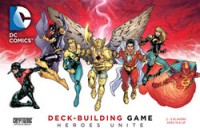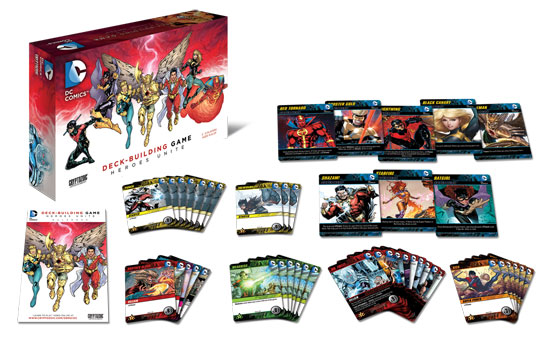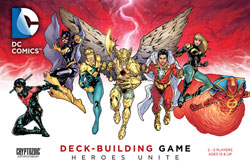
DC Comics Deck-Building Game: Heroes Unite
In the DC Comics Deck-building Game: Heroes Unite, each player takes on the role of a Super Hero such as Shazam! or Hawkman. Your Super Hero has an ability that will guide your strategy throughout the game.
Each player starts with his own basic 10-card deck and draws a hand of 5 cards each turn. Power is the currency you will use to buy new, stronger cards to add to your deck. A large, central stack of cards supplies a five-card “Line-Up” from which players make their purchases. Each player will always have five face-up cards to choose from each turn, so every turn there are new options and surprises.
When a player has amassed enough Power, he or she may defeat the current Super-Villain. When a Super-Villain is defeated, a new one appears and makes an Attack against each player in the game! Players can defend themselves with Defense cards like Force Field, the Helmet of Fate, or several others. In the end, the player who has accumulated the most Victory Points from the cards in his or her deck wins the game. This is the follow-up to the 2012 hit DC Comics Deck-building Game. Play Heroes United on its own, or combine it with the original for an epic battle!


Key Features
- Play as Shazam!, Hawkman, Red Tornado, Nightwing, Black Canary, Batgirl, or Booster Gold.
- Each Super Hero has a unique special ability that will open up different strategies to the player. Follow that strategy or break away with a plan of your own!
- Card combos, strategy, and fun abound in this game where every card is a well-known, fan-favorite card with amazing art.
- This is a standalone game, but also an expansion to the hit DC Comics Deck-building Game released in late 2012. Mix the two sets together for the ultimate showdown!
- Easy to learn, entertaining and engaging gameplay.
User Reviews (4)
Add a Review for "DC Comics Deck-Building Game: Heroes Unite"
You must be logged in to add a review.

DC Comics Deck-Building Game: Heroes Unite is the second standalone superhero-themed game by Cryptozoic using its “Cerberus Engine” common to its deckbuilding titles. The mechanics are identical to the original game, so I will not rehash them in this review. The fixed setup cards for Heroes Unite function identically — Punch, Vulnerability, Kick, Weakness — but each has new artwork centered around the new superheroes in this set.
Those new superheroes are part of what makes Heroes Unite interesting as a standalone game. While the original game uses primarily flagship Justice League characters (Superman, Batman, Wonder Woman, et al.), the heroes here are more of mixed bag: Shazam, Nightwing, Batgirl, Black Canary, Hawkman, Red Tornado, Booster Gold. Some abilities are almost complementary to the seven heroes in the DC Comics Deck-Building Game, with Hawkman and Black Canary strongly resembling Superman and Batman for different card types. Nightwing works off Equipment, but feels a bit like Cyborg instead of Batman. The similarities mostly end there.
Booster Gold works best off your acquisition of Defense cards, making them worth your while even when you’re not avoiding Attacks with them. Batgirl has an interesting early-game accelerator, allowing you to discard a Punch card once per turn to draw a card. Shazam has an unpredictability factor, letting you spend 4 Power (a common amount for early turns) to acquire the top card of the Main Deck, choosing to put it on top of your deck or in the discard pile. Since you don’t know what you will get, this ability is a double-edged sword. Finally, Red Tornado requires you to have a variety of cards in your discard pile; his is one of the more strategic abilities to use properly.
The Main Deck and Supervillains are also all-different in Heroes Unite. One of the themes that runs throughout the Main Deck is the Lantern Corps and the various Power Rings — an unusual choice in a deck without Green Lantern as a primary Superhero, until you see the Hero card Kyle Rayner (one of the later Green Lanterns), who enables an alternative victory condition. The Power Rings are all interesting and potentially quite powerful in their own right.
One thing that Heroes Unite gets very right in comparison to the original game is in scaling back somewhat on the raw power of cards, in favor of supporting card combinations and synergy. The Locations, in particular, while still largely centering on card draw, do not overclock a player’s strategy here. There are a few cards that reference each other by name, and generate strong effects should you manage to acquire all of the correct pieces. Additionally, there are a few more key deck-thinning pieces so that they do not feel like they are at a premium. Still, sharp players will jump on those that come by in the Line-Up.
The thematic issues which plagued the DC Comics Deck-Building Game still exist, and are even a bit more exacerbated by the non-unified heroes. Those who don’t have a deeper knowledge of the DC milieu, and want at least to play with more familiar faces, may want to go with the original. By addressing some of the balance issues and offering more interesting combo-driven play, however, Heroes Unite is a superior base set from a gameplay point of view, offering another easy-to-learn deckbuilder, but with even more opportunity for players to learn more complex strategies as they come back to the game.
Pros:
Improved standalone gameplay over DC Comics Deck-Building Game
– better balance
– more deck-thinning options
Good combo-driven play
Same positives as original
Cons:
Thematically weak
Main characters are less well-known
DC Comics Deck-Building Game review
DC Comics Deck-Building Game: Forever Evil review
DC Comics Deck-Building Game: Teen Titans review
DC Comics Deck-Building Game: Rivals – Batman vs The Joker review
DC Comics Deck-building Game: Heroes Unite doesn’t break the mold, or even change a lot from the core game play found in the original DC Deckbuilder, but that might be seen as a good thing to fans of the original. This is not to say there aren’t new and exciting features to the standalone expansion – but merely to point out that fans of the original will feel right at home. I found myself eager to dive into the main deck, revealing new and interesting super powers, heroes and villains and loved to hate the new attacks that the new Super Villains possessed.
Gameplay:
Those familiar with the genre will understand the mechanics right away. Each player starts with identical core decks and gradually adds cards by using the games sole currency – Power – to obtain new, more powerful cards. Along with identical starting decks, each player takes on the identity of a specific hero who has unique abilities. Though slow to start, DC Deckbuilder and its expansion shine in the end game when each player starts to pull of enormous combos. Once the last Super Villain is defeated players total the points of their purchased cards with the highest number being the winner.
Theme:
Some may view the theme as a tack-on and need not even pay attention in order to enjoy the game. However, I found the theme to be appropriate and thought out. I enjoyed obtaining power ring cards that created a force field of protection from attacks or buying a location that appropriately assists villains or heroes in my deck.
Components:
The game contains some 200+ high quality cards. The cards are easy to read and understand. I thought the artwork in Heroes Unite was just as good if not better than the original.
Final Thoughts:
This stand alone expansion does not reinvent the wheel when it comes to deckbuilders – and that’s okay. Erik Larsen and Cryptozoic Entertainment deliver another great game that continues to hit our table. This is an excellent game to introduce deckbuilding to your playgroup as it uses simple, easy to pick up mechanics and has a fun theme – who doesn’t love super heroes?!
This review comes from someone who normally plays scrabble, or angry birds, or texas holdem, who has recently been trying these types of board games. I played this once, last weekend, and did enjoy it. Game lasted about 2.5 hours (5 players which is the max). Moderate in complexity, I was getting the hang of it half way through, but fully understood the game once we were done and had added up the points to determine the winner. I feel that the second time I play (or you play), you will be hitting the ground running. I liked the mechanics of the game, there’s lots of room for variability, starting w/ what player you are, and what cards you end up able to buy as you go. So high replay value. Components – easy setup, “just right” amount of variables. Moderately easy to learn, to a degree depends how much you’ve played similar games. Have played a second time now, still really like it, but felt like there was a lot more luck than skill involved, starting with which hero you randomly draw, which decides your special skill and which cards you are able to purchase.
The second part to DC deck builder just continues where the first set leaves off. New heroes new cards same system. What was great about the first game is still great about this game. New combos came to life with the new cards and the power rings are a great addition. Combining the two games makes for some of the greatest games we have ever seen. Where one game was weak for one hero the two come together to balance things out. We have now made some home brewed variations to expand the fun and we are always trying new fun methods not because it is boring but because we just cant get enough of this game.